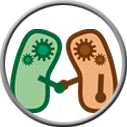Team:Calgary/Outreach/Collaboration
From 2011.igem.org
(Difference between revisions)
Emily Hicks (Talk | contribs) |
Emily Hicks (Talk | contribs) |
||
| Line 4: | Line 4: | ||
TITLE=Collaboration| | TITLE=Collaboration| | ||
BODY=<html> | BODY=<html> | ||
| - | Another important part of iGEM is helping other teams through collaboration. As | + | Another important part of iGEM is helping other teams through collaboration. As in previous years, we had the opportunity to meet up with the other Alberta teams (Lethbridge and Alberta) at several points during the Summer. We had the opportunity to ask questions, do practice presentations for each other, as well as give each other ideas for each specific project. This was an awesome ressource, especially given that all three teams are looking at oil sands and/or energy-related projects. September 24-25th, all Alberta iGEM teams met for the 3rd annual aGEM competition, where we all did a mock iGEM presentation and got questions and feedback from the other teams as well as from a group of judges. This event was organized by AITF, one of our major sponsors. |
| - | + | <br> | |
| - | We | + | In discussions with the Lethbridge iGEM team, we discovered that we're both interested in the viability of E. coli in tailings pond samples. The Lethbridge team wants to eventually house their system in E. Coli; although we do not, we are still interested in it in case we encounter difficulties with pseudomonas. We have done previous viability assays, however only in commercial NA mixtures. Tailings ponds have a large amount of different toxic compounds in them other than NA's. In addiion, different tailings pond samples can have a very different composition, depending on which pond they were taken from, and even which section or depth of the pond they were taken from. Because of this, we deicided that it may be intersting to test the viability of E. Coli in different samples of tailings pond water. The Lethbridge team has access to one sample |
Protocol: | Protocol: | ||
</html> | </html> | ||
}} | }} | ||
Revision as of 01:12, 28 September 2011









Collaboration

Another important part of iGEM is helping other teams through collaboration. As in previous years, we had the opportunity to meet up with the other Alberta teams (Lethbridge and Alberta) at several points during the Summer. We had the opportunity to ask questions, do practice presentations for each other, as well as give each other ideas for each specific project. This was an awesome ressource, especially given that all three teams are looking at oil sands and/or energy-related projects. September 24-25th, all Alberta iGEM teams met for the 3rd annual aGEM competition, where we all did a mock iGEM presentation and got questions and feedback from the other teams as well as from a group of judges. This event was organized by AITF, one of our major sponsors.
In discussions with the Lethbridge iGEM team, we discovered that we're both interested in the viability of E. coli in tailings pond samples. The Lethbridge team wants to eventually house their system in E. Coli; although we do not, we are still interested in it in case we encounter difficulties with pseudomonas. We have done previous viability assays, however only in commercial NA mixtures. Tailings ponds have a large amount of different toxic compounds in them other than NA's. In addiion, different tailings pond samples can have a very different composition, depending on which pond they were taken from, and even which section or depth of the pond they were taken from. Because of this, we deicided that it may be intersting to test the viability of E. Coli in different samples of tailings pond water. The Lethbridge team has access to one sample Protocol:
In discussions with the Lethbridge iGEM team, we discovered that we're both interested in the viability of E. coli in tailings pond samples. The Lethbridge team wants to eventually house their system in E. Coli; although we do not, we are still interested in it in case we encounter difficulties with pseudomonas. We have done previous viability assays, however only in commercial NA mixtures. Tailings ponds have a large amount of different toxic compounds in them other than NA's. In addiion, different tailings pond samples can have a very different composition, depending on which pond they were taken from, and even which section or depth of the pond they were taken from. Because of this, we deicided that it may be intersting to test the viability of E. Coli in different samples of tailings pond water. The Lethbridge team has access to one sample Protocol:

 "
"






